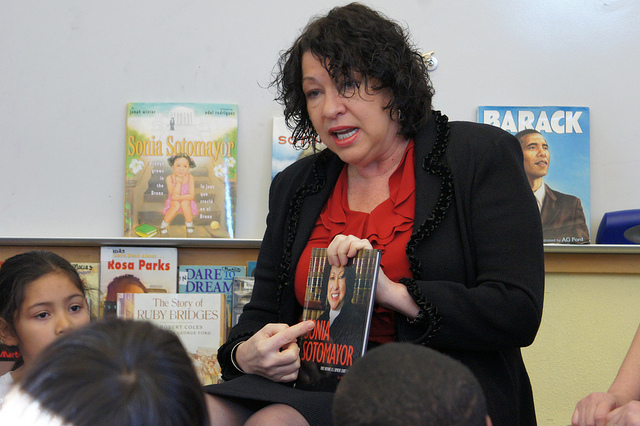
Supreme Court Justice Sonia Sotomayor says that without proper privacy safeguards, the advancement of technology could lead to a world like the one portrayed in "1984" by George Orwell.
Speaking to Oklahoma City University faculty and students, the justice said Thursday that technology has allowed devices to "listen to your conversations from miles away and through your walls." She added: "We are in that brave new world, and we are capable of being in that Orwellian world, too."
The President Obama appointee also discussed the lack of privacy standards concerning drones.
There are drones flying over the air randomly that are recording everything that’s happening on what we consider our private property. That type of technology has to stimulate us to think about what is it that we cherish in privacy and how far we want to protect it and from whom. Because people think that it should be protected just against government intrusion, but I don’t like the fact that someone I don’t know…can pick up, if they’re a private citizen, one of these drones and fly it over my property.
The justice's remarks about drones comes as California is close to joining 10 other states requiring the police to get a court warrant to surveil with a drone. Those states include Florida, Idaho, Illinois, Indiana, Iowa, Montana, Oregon, Tennessee, Utah and Wisconsin. California's bill is pending, awaiting action from Gov. Jerry Brown.
"If the police send a drone to surveil communities, they should get a warrant to do that," Rebecca Farmer, an American Civil Liberties Union spokeswoman, said in a telephone interview Friday.
These laws, however, have exemptions that allow the authorities to fly drones for a variety of uses. As Slate put it, "California’s drone bill is not draconian. It includes exceptions for emergency situations, search-and-rescue efforts, traffic first responders, and inspection of wildfires. It allows other public agencies to use drones for other purposes—just not law enforcement."
Sotomayor, meanwhile, sits on the nation's highest court that in June unanimously ruled in favor of the public's mobile phone privacy. In an opinion by Chief Justice John Roberts, the court ruled that the authorities generally may not search the mobile phones of those they arrest unless they have a court warrant. The Obama administration and prosecutors from states across the country had lobbied the high court in briefs to allow police officers to be able to search arrestees' gadgets—not just mobile phones—without a warrant.
It was the biggest digital-age privacy decision that the high court had rendered following its 2012 ruling that the authorities generally need warrants to affix GPS trackers to a suspect's vehicle.
Sotomayor, the court's first Hispanic justice, did not mention the Edward Snowden leaks that, by some accounts, shows the use of technology is already being used in an Orwellian manner.
And when the high court got its first chance to look at one aspect of the program, it declined to do so and let stand the government's bulk metadata phone collection program Snowden disclosed.
Listing image by Talk Radio News Service
reader comments
132